Trends and the Future of Pop-Up Store
2023.06.10
A growing number of consumers discover and explore pop-up or flagship stores through social media, especially for brands that are expanding or already have a significant presence. A pop-up and flagship store have become the most popular way for brands to showcase themselves. In particular, pop-ups have caught the attention of Generation Z, who expect distinctive elements, exceptional experiences, visually appealing content and enjoyable interactions. A pop-up store refers to a temporary retail space that operates for a short duration, much like a 'pop-up' window that appears and disappears from an internet webpage. Unlike a regular store that consistently sells products or services in a fixed location, a pop-up store is only open for a brief period, often used to establish a brand's identity with customers and promote it, especially during the launch phase of a new brand or product. On the other hand, a flagship store serves as the ultimate representation of a brand. Just as a flagship leads a fleet of ships with its command center, a flagship store leads the brand's identity and sets the standard for the rest of the retail outlets. It exemplifies the brand's personality and image through carefully crafted interiors and experiential spaces, perfectly aligned with the brand's identity.
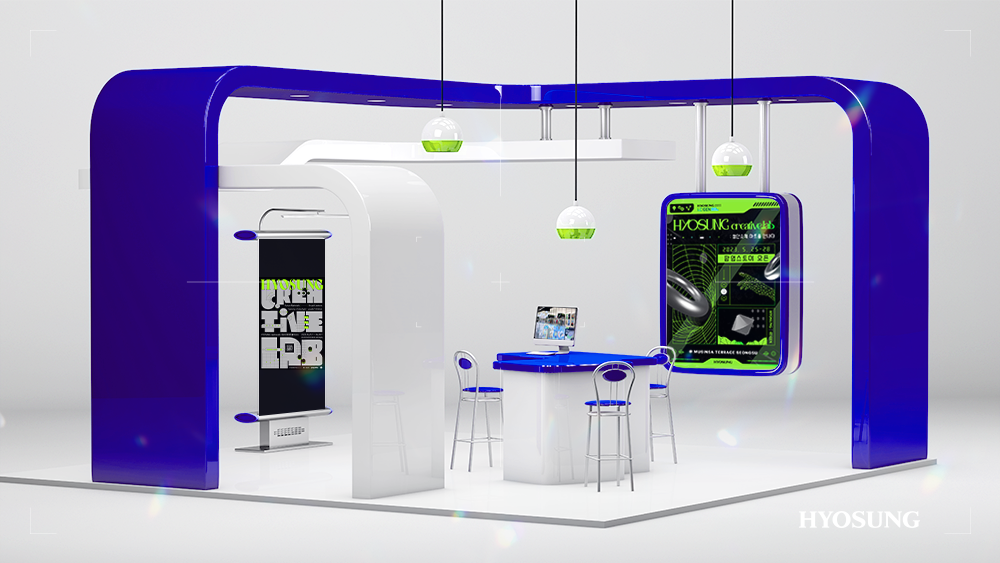
The Z Generation's Fascination with Pop-Up Stores
South Korea, a global internet powerhouse, has a highly active online distribution system. Combined with fast delivery services, this has led to significant changes in the distribution network, weakening traditional retail structures. Retailers have been closing their stores in droves, from small offline shops to large corporations, including department stores and franchises. The prolonged social distancing due to COVID-19 has further accelerated the decline of traditional retail structures, resulting in a noticeable increase in vacant stores.
However, pop-up stores remain popular and are increasingly used by various brands as active retail establishments for online and offline marketing. Originally conceived as a means for new brands or products to gauge customer responses and establish brand identities, pop-up stores have evolved into experiential venues and playgrounds for the Z generation, rapidly proliferating. For the Z generation, who share their favorite locations on social media, trendy pop-up stores have become spaces where unique interiors, photo zones, experiences, and attractions converge, elevating their appeal as "Instagrammable" destinations.
Nowadays, department stores and shopping malls have started designating specific areas for pop-up stores, recognizing their popularity. Even convenience stores and supermarkets have joined the trend of pop-up marketing. Brands from various fields, including fashion, beauty, food and beverage, gaming, and furniture, now operate pop-up stores.
From the US to the Metaverse: The Evolution of Pop-up Stores
Pop-up stores were born in the early 2000s when Target, a prominent American discount retailer, opened a temporary storefront after being unable to secure a permanent location. In Korea, this concept began modestly, with products sold atop makeshift stands with minimal interior decor, evoking the humble and sparse feel of a discount stand. KUHO, under the aegis of Cheil Industries, unveiled the first pop-up store in Korea in 2009, sparking a trend that has since proliferated into the phenomenon we see today.
As temporary showcases for new products, pop-up stores have evolved into multifaceted cultural spaces and playgrounds for the Z generation. They enhance brand awareness and provide unique experiences. Many sectors operate pop-up stores today, including groceries, furniture, information technology (IT), convenience stores, fashion, beauty, finance, and gaming. The popularity of these stores has been further enhanced by the emergence of pop-up stores associated with K-POP celebrities like BTS, New Jeans, and TWICE. The rise of metaverse pop-up stores is another example of innovation replicating their real-world counterparts or existing only in the metaverse. The popular metaverse game ZEPETO offers pop-up stores comparable to offline stores in reach.
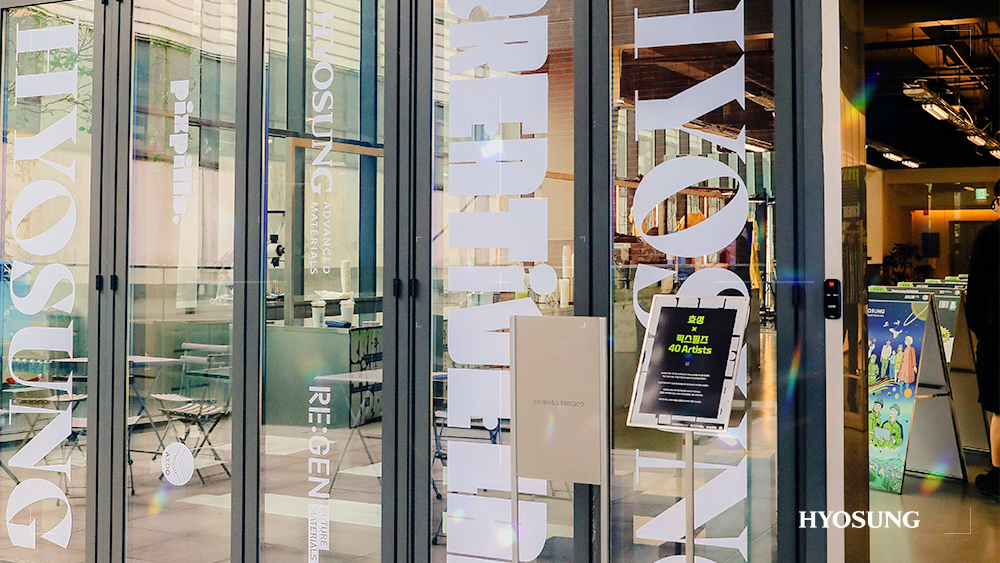
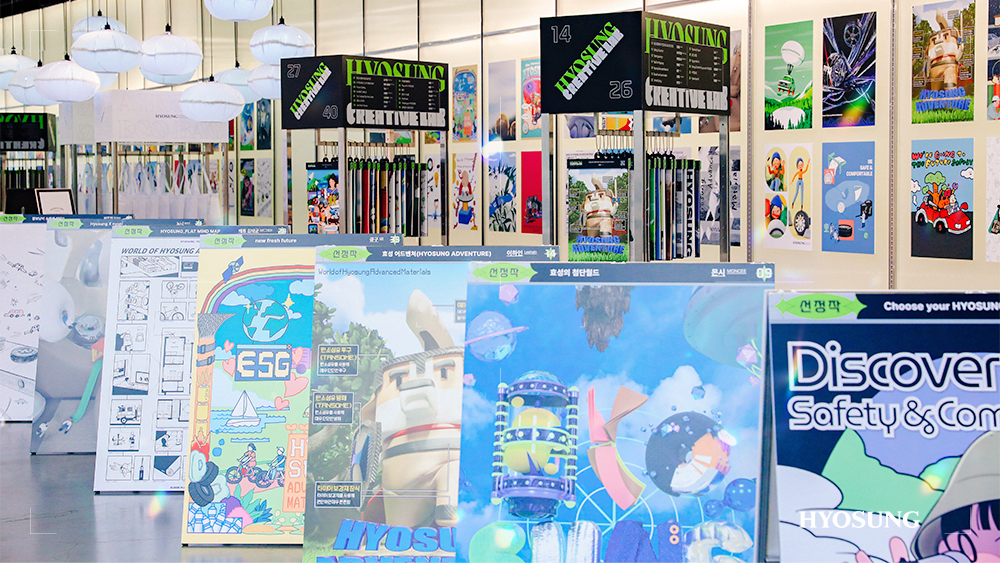
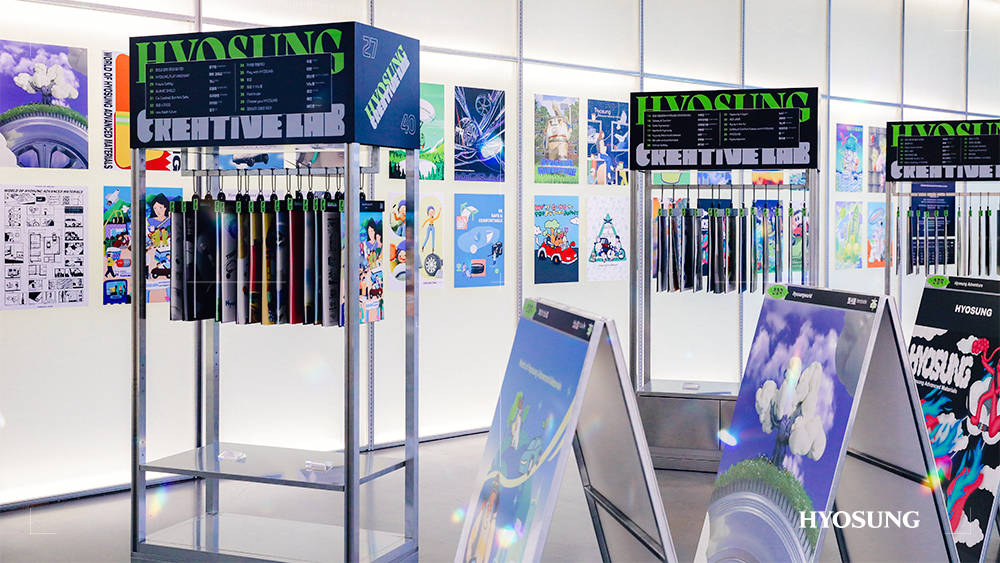
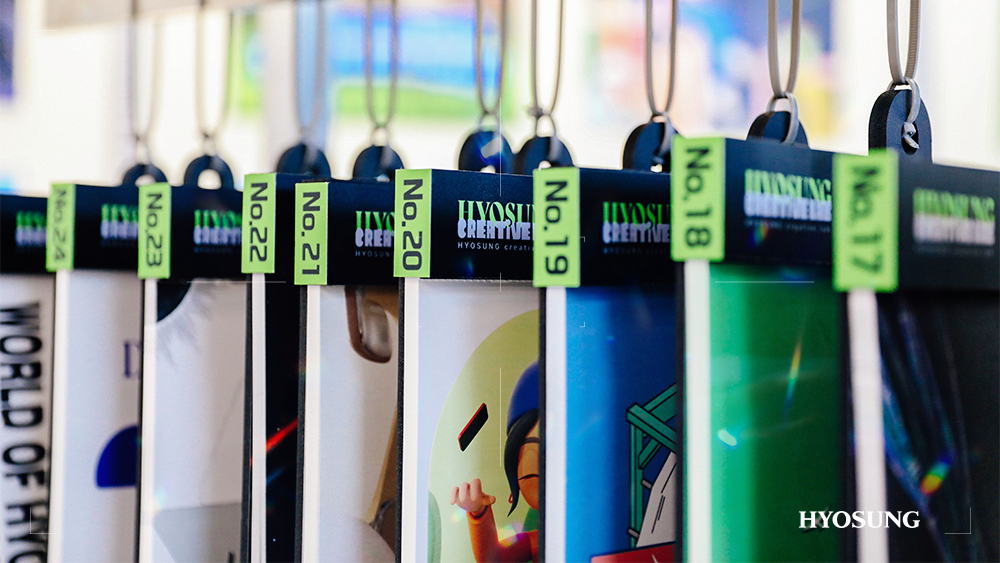
<HYOSUNG creative.lab / MUSINSA Terrace in Seongsu-dong>
Hyosung’s Various Pop-up Stores
Hyosung has been a forerunner in deploying various pop-up stores across its diverse business segments and plans to continue this trend in both online and offline domains. In addition to the MUJI collaboration, Hyosung organized the eco-friendly 'Filter' store. The MUJI pop-up store, which debuted on April 15th at Lotte World Mall, showcased 'Regen Sneakers,' a product of collaboration between Hyosung TNC, MUJI, and LAR. The limited-edition eco-friendly 'Regen Sneakers,' developed by Hyosung TNC, an eco-friendly textile producer, MUJI, a proponent of an eco-friendly lifestyle, and LAR, an eco-friendly shoe manufacturer, were produced in only 1000 pairs. These sneakers were exclusively created for the pop-up store and are available for sale there.
Another remarkable pop-up store organized by Hyosung took place in Jeju. The Filter, a pop-up store and eco-friendly exhibition held at the Iho Tewoo Beach in Jeju in collaboration with Jeju Special Self-Governing Province and Jeju Tourism Organization, with Hyosung TNC. The store featured various attractions, including a photo zone adorned with a large backdrop of Regen Jeju, an eco-friendly fiber developed by Hyosung TNC. Additionally, the pop-up space offered bags crafted from recycled materials. The showcased bags, made from clothes donated by NIKE and Hyosung's Regen, received a positive response.
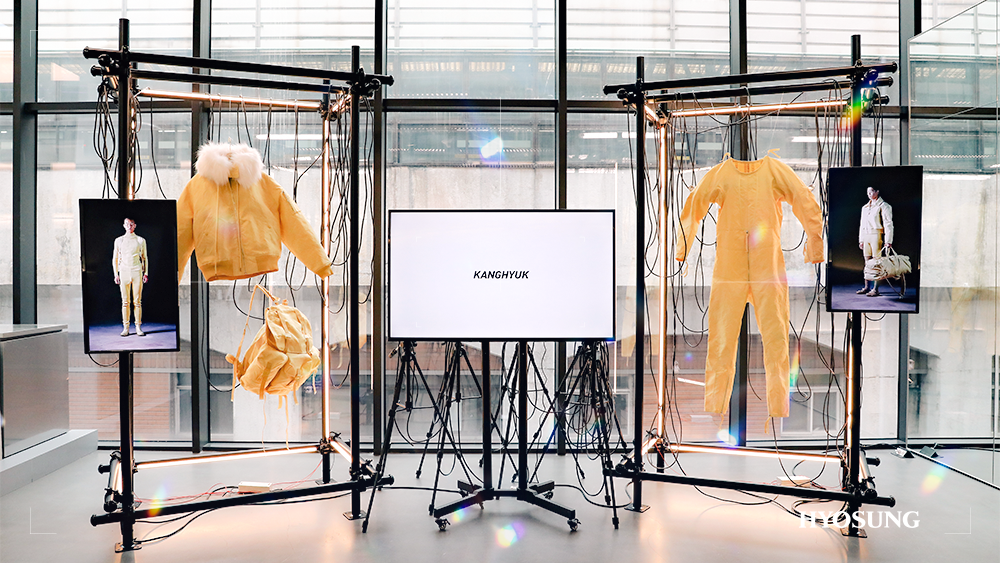
<HYOSUNG creative.lab / MUSINSA Terrace in Seongsu-dong>
After that, Hyosung Advanced Materials organized an eco-friendly art contest and a pop-up store called 'HYOSUNG creative.lab'. This unique pop-up store showcased the winning works that best represented the core technologies and products, and eco-friendly vision of Hyosung Advanced Materials. It also featured collaboration with fashion brands, displaying and selling clothing, bags, and Hyosung brand merchandise. To enhance the overall experience, Hyosung Advanced Materials offered live DJing and cafe services. Combining the location's advantages with the eco-friendly mega-trend, Hyosung Advanced Materials successfully introduced itself to trend-sensitive Z generation at the MUSINSA Terrace in Seongsu-dong.
At five of the Hyundai Department Store's locations, HYOSUNG creative.lab had the opportunity to collaborate and organize pop-up stores. It started at Hyundai Department Store Mokdong, continued to Cheonho, D-Cube City, Jungdong, and concluded at Hyundai Daegu. A theme of the pop-up stores, jointly presented by Hyosung Advanced Materials and Hyundai Department Store, was "Discover New Safety and Comfort through Future Materials. There were 48 art contest winners on display at the Seongsu pop-up store on Musinsa Terrace as well as fashion collaborations between Kang Hyuk and Hyosung Advanced Materials as part of the exhibition. In addition to upcycled aramid fire suits from the eco-friendly brand 119REO, the exhibition featured modernized versions of Hyosung Advanced Materials' seat belts and carpets.
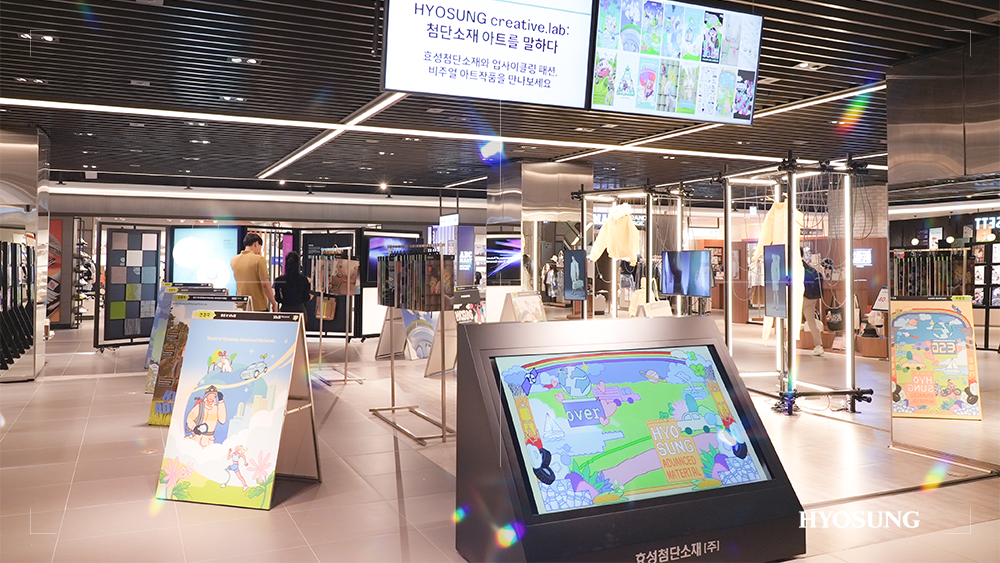
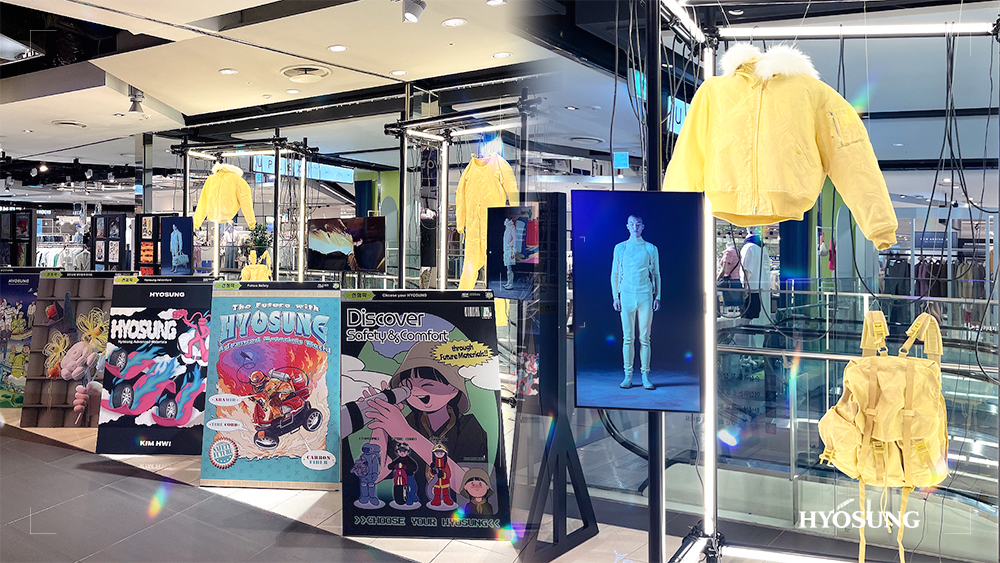
<HYOSUNG creative.lab / Hyundai Department Store>
Hyosung Advanced Materials also participated in OOPSEOUL, an online and offline visual art festival organized by Axoo, a global visual artist platform. At OOPSEOUL, Hyosung Advanced Materials hosted an inflatable art exhibition and an exhibition on future materials, and based on the enjoyment of visual art, Hyosung Advanced Materials aimed to visually showcase, tell stories, and build empathy with the public about Hyosung Advanced Materials' future materials.
Hyosung is committed to organizing various pop-up stores in the future, swiftly and accurately embracing trends, and fostering quick communication and intimacy with customers through diverse methods and venues. Just as Hyosung has already introduced a digital showroom for the Metaverse Hyosung Group, they plan to operate pop-up stores wherever they can engage with customers, without distinguishing between online and offline spaces. Hyosung strive to create more meaningful and trendy pop-up experiences.
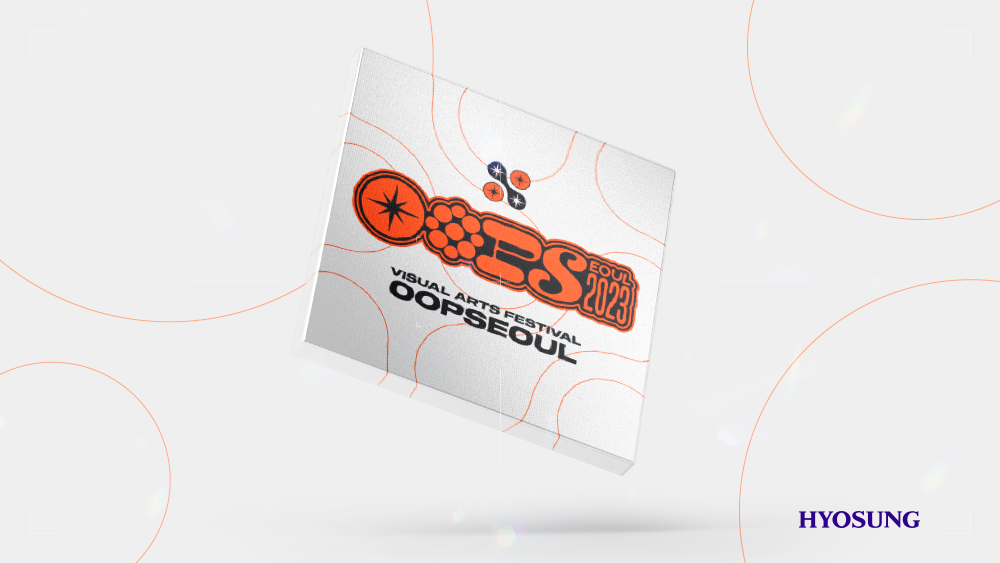
Pop-up stores initially served as a marketing tool for new brands and products, enabling market research and demand analysis during product launches. However, contemporary pop-up stores have evolved into cultural hubs that allow customers to experience the values and identity a brand represents rather than merely promoting a brand or product. Pop-up stores, transcending virtual and physical realms, have begun to shape new distribution structures and drive trends and culture while continuously evolving and growing. Hyosung operates pop-up stores that offer opportunities to experience the eco-friendly lifestyle they advocate by using eco-friendly textiles for photo zones, selling upcycled bags, and showcasing sustainable footwear.
As social distancing measures end and everyday life resumes, returning pop-up stores will remain popular. Hyosung will create opportunities to meet customers in various ways, reflecting the pop-up store trend and sharing the eco-friendly values they pursue with their clientele.